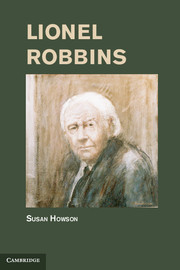Book contents
- Frontmatter
- Contents
- Illustrations
- Abbreviations
- Introduction
- One Father and Son
- Two The Great War
- Three Postwar
- Four The London School of Economics
- Five Iris Gardiner
- Six New College Oxford
- Seven The Young Professor
- Eight Fritz and Lionel
- Nine The School in the Mid-1930s
- Ten The Approach of War
- Eleven The Economics of War
- Twelve Director of the Economic Section
- Thirteen Anglo-American Conversations
- Fourteen The Law Mission and the Steering Committee
- Fifteen 1 9 4 4
- Sixteen The Last Months of the War
- Seventeen The Postwar Settlement
- Eighteen Return to the School
- Nineteen The End of the Transition
- Twenty LSE in the Early 1950s
- Twenty-One Chairman of the National Gallery
- Twenty-two Lord Robbins
- Twenty-three The Robbins Report
- Twenty-four The Sixties
- Twenty-five The Arts
- Twenty-six The Troubles at LSE
- Twenty-seven Retirement
- Conclusion
- Bibliography
- Index
Introduction
Published online by Cambridge University Press: 07 October 2011
- Frontmatter
- Contents
- Illustrations
- Abbreviations
- Introduction
- One Father and Son
- Two The Great War
- Three Postwar
- Four The London School of Economics
- Five Iris Gardiner
- Six New College Oxford
- Seven The Young Professor
- Eight Fritz and Lionel
- Nine The School in the Mid-1930s
- Ten The Approach of War
- Eleven The Economics of War
- Twelve Director of the Economic Section
- Thirteen Anglo-American Conversations
- Fourteen The Law Mission and the Steering Committee
- Fifteen 1 9 4 4
- Sixteen The Last Months of the War
- Seventeen The Postwar Settlement
- Eighteen Return to the School
- Nineteen The End of the Transition
- Twenty LSE in the Early 1950s
- Twenty-One Chairman of the National Gallery
- Twenty-two Lord Robbins
- Twenty-three The Robbins Report
- Twenty-four The Sixties
- Twenty-five The Arts
- Twenty-six The Troubles at LSE
- Twenty-seven Retirement
- Conclusion
- Bibliography
- Index
Summary
I have often been asked why I am writing a biography of Lionel Robbins. I usually reply, truthfully, ‘His family asked me to.’ But that is not the answer to the question I am being asked. The English economist Lionel Robbins (1898–1984) left his mark in several ways, in his own country and elsewhere. His legacy remains in at least three areas: the academic discipline of economics; UK domestic and international economic policy, especially in the Second World War; and the arts in Britain. He is most associated with the London School of Economics (‘LSE’ or ‘the School’ to its students and staff), whose Economics Department he headed for thirty years and built up to its preeminent position in British economics. To economists he is still known as the author of An Essay on the Nature and Significance of Economic Science (1932 and 1935), which is one of the three most important methodological statements on economics, and the source of its famous definition, ‘Economics is the science which studies human behaviour as a relationship between ends and scarce means which have alternative uses.’ But he was always as much interested in economic policy as in economic theory, in what he called political economy as distinct from economic science. During the Second World War, he entered government service in June 1940 and became (1941–5) the head of the group of economists advising the coalition government under Winston Churchill. As well as helping to create the British total war economy, he was decisively involved in the preparation of the white paper, Employment Policy (1944), and in the creation of the postwar international economy – a major figure in the process by which the visionary ideas of John Maynard Keynes in Britain and Harry Dexter White in the USA became the Bretton Woods institutions: the International Monetary Fund and the World Bank – and in the notoriously difficult Anglo-American loan negotiations at the end of the war, which allowed Britain to participate in the new postwar economic order. He was also a lover of the visual and performing arts, who took advantage of his skills and opportunities to serve the arts in the management of the Courtauld Institute of Art, the National Gallery and the Royal Opera House in London. Although he became famous in the 1960s for the ‘Robbins Report’ of the Committee on Higher Education (1961–3), his contribution to the well-being of the arts in Britain has been longer lasting. According to the recent historian of the National Gallery (Conlin 2006, 184), ‘The economist Lionel Robbins was probably the greatest of the Trustees to serve in the last century’ and ‘arguably the most effective Trustee the Gallery ever had.’
- Type
- Chapter
- Information
- Lionel Robbins , pp. 1 - 10Publisher: Cambridge University PressPrint publication year: 2011



